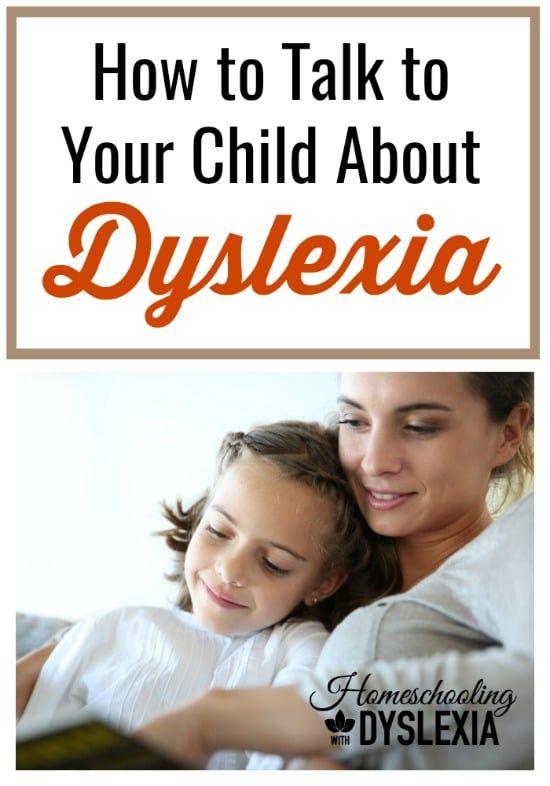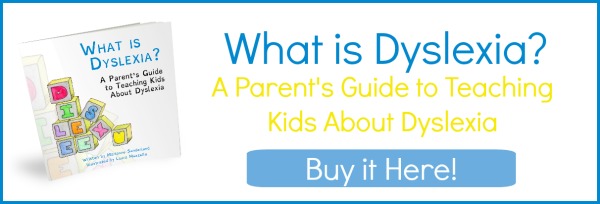A reader of a newly diagnosed child recently asked how to talk to her child about being dyslexic. What do you think? What do our young children need to know about their dyslexia?

I asked the question to the Homeschooling With Dyslexia Facebook Group and got some wonderful answers! These are parents who have jumped in with both feet to learn about their kids and to provide them with the best education possible. I think you will learn a lot from their answers, posted below:
1. Dyslexia is just a word that means you learn differently. While many people think in words, people with dyslexia tend to think in pictures. This is why reading is hard at first.
2. You are smart! Because kids with dyslexia often have trouble learning to read, some people – including you! – might think that you aren’t smart. You are a different kind of smart. Many people with dyslexia love to invent things, play music, excel in sports, business, love animals, cooking, acting and other more creative pursuits.
3. These learning differences make you unique rather than average.
4. Your brain learns things differently than other people. This will make some things harder for you to get done, but you CAN do anything. It will also make some things MUCH easier for you to do which will make other people amazed at how smart you are!
5. There are lots of people with dyslexia who have done amazing things. Read this list of famous dyslexics to see for yourself!
6. Assure them that they will learn to read and that all of us have unique learning needs. Explain that dyslexia is difficult in school because it’s a memory-based difference. While many things are easily remembered, random things can be difficult. “Why IS January named January?! Why IS the letter b a small circle with a long stem facing that way? There is NO reason – it’s a human convention that’s hard for many to remember!” They usually get a good laugh out of that.
7. You will learn to read and write and spell like all of your friends. All dyslexics can learn to read and write and spell. You just need to be taught using the right methods. Read this series on how to teach kids with dyslexia to read.
8. I told my own daughter she is a “right brained thinker” and that your language is located in your left part of the brain and it doesn’t mean anything is wrong with her. She wouldn’t be who she is without dyslexia because there are also pros to it. Like being an outside the box person. I also told her this (we live an hour from Indianapolis) “Sis,if you wanted to get to Indianapolis but I gave you the wrong directions would you get there?” She said “Well,I might but it would take a long time and I would need help” I said “that’s the problem with dyslexia,we’ve been giving you the wrong directions. Its nothing you did wrong. We just need to give you the right directions.”
9. Here is my simple reminder to my daughter. “Your brain doesn’t want to read books….. Your brain is busy writing books.”
10. I would tell her that God made her brain a different way, but a beautiful way. She sees things differently, but creatively. I would tell her that He has given her this gift, and that since He did, he will also help her persevere and learn to read. That she may always have just a little trouble reading, or be slower at it than other people, but she will also have more creativity than usual. Lastly I would tell her it can be a fun gift. I mean, how many other people can see their letters dancing around? These are the things I told my daughter when we found out she was dyslexic at 7. She has been working hard at it ever since, and is now reading with ease at a 4th grade level.
11. She’s not broken and you’re not trying to fix her. That her dyslexia just has her thinking in a different way than most other kids. That she just needs to do “her” best. That you have her back always! And, that she’s beautiful inside and out and you love her.
12. We emphasized that dyslexics, by definition, are of higher intelligence…our dd kept saying she was stupid and too dumb to learn. .. and we watched this….
13. That it’s okay to be “labeled.” That way, she can go on to help others who are struggling too.
This is our theme verse from the Bible:
2 Cor. 1:3-4 “Praise be to the God and Father of our Lord Jesus Christ, the Father of compassion and the God of all comfort, who comforts us in all our troubles, so that we can comfort those in any trouble with the comfort we ourselves receive from God.” Read this post for more thoughts on labeling kids with dyslexia.
14. All my eight year old son needed was to know that he wasn’t stupid. The rest of the explanation, for him, was gravy.
15. When God designed her brain, he did so for a reason, its wired specifically for her special gifts and talents. she will find that somethings will be very hard, but super easy for her and very hard or if not impossible for others. My daughter is 15 and in the STEM engineering program in high school, come to find out through testing she has a true engineering brain, for females is uncommon, out performs the males in every area in engineering and its because her brain works differently, she can look at stuff and reengineer it, it the point she made a puzzle cube, and in order to make it work you have to put these crazy peices together that shouldn’t go together, well i noticed she incorporated her initals of her name, it took me 4 hours to figure it out until i realized what the smarty pants did
16. Acknowledge the emotions that it’s causing the child. Reassure her that there isn’t anything wrong with her.
•that we all learn differently
•that some of the richest/smartest/most talented artists,sculptors,actors, inventors etc have the same difficulty
•that it’s not a disability and she’s not stupid
17. This is a gift, we just have to learn how to teach someone with this gift. You are gifted, I don’t know how to teach you, but Virginia (tutor) does and she will help.” Explaining his tutoring 2x/week THROUGH THE SUMMER, “when she starts it will be things you know, hang in there and just humor me for a few lessons. I promise by lesson 3 you will KNOW you can read.” He was always excited for tutoring, even after being in public school all day. He finally KNEW he could do this AND it was easy!
18. Some people are PCs and others are MACs. They don’t work on the same software but they can both do amazing things.
19. I just had to do this for my 8 year old, 4 weeks ago! I told him that everyone’s brain works differently and learns differently. I showed him a big list of famous peoples pictures that have dyslexia and said, “These people have brains that kinda work like yours and look at all the things they have done.” Then I told him there is nothing wrong with him, he just learns and does things a little differently and that makes him unique rather than average. He got a really big smile, picked up and book and said “let’s do this mommy!”
20. I am dyslexic and so is my daughter so it was easy to explain that not everyone thinks like we do. I told her we think in pictures not words so learning to read and write is like climbing up a mountain, hard but worth it. And once you get up the mountain you don’t have to climb up it again. We also talked about how we can build and take apart things in our mind since we think visually. It isn’t a bad thing, just a different way of processing the world.
21. I pointed out the things that she was particularly gifted at which other non dyslexic people aren’t so good at, and said that we would work out ways around things to make sure she could still do all the things she wanted to do
22. I have dysgraphia, when my sweet girl gets frustrated and tells me she gets words mixed up, I tell her mama does the exact same thing with numbers. She is reassured and comforted by seeing how I’ve developed strategies and I think it helps me understand her better. We are in this together and she is a super smart cookie. We told her she learned perseverance this year and that is a very important life skill to have in her tool box.
I hope this post has been an encouragement to you. Research on successful dyslexics says that the number one most powerful thing in the lives of these successful dyslexics was the presence of one caring adult who helped them navigate their dyslexia. That is you!
If you enjoyed this post, you will enjoy the conversation going on at the Homeschooling With Dyslexia Facebook Page.
Thanks for connecting with us! What would you tell your young child with dyslexia?
If you’re looking for a resource for guiding you as you teach your child about dyslexia, check out my new book!






This post is a wonderful compilation of advice for parents to talk to their children about their new diagnosis. I have found reading some of Patricia Polacco or Henry Winkler’s book about students with dyslexia as a go way for children to feel like they are not the only child who has faced this same struggle. There are several excellent documentaries on dyslexia where the child can hear the stories of individuals who have faced different challenges with their dyslexia and lived to tell the tale.